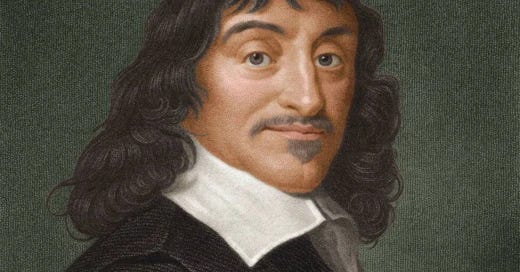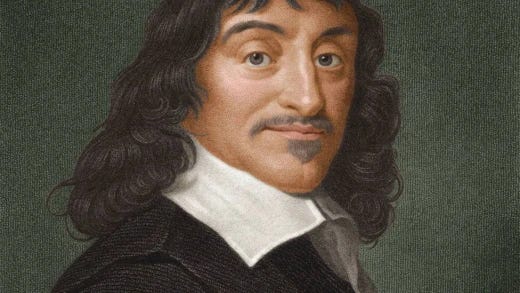Descartes and our AI Worldview
He exemplified the spirit of questioning, experimentation, and transformation
His name is often uttered as a philosophical staple, a mathematician revered for his analytical geometry, yet seen through a lens often cloudy, often dismissive when it comes to his role in science. That man was René Descartes. A man we know of, but perhaps do not quite understand. Descartes can teach us valuable lessons about human progress and transformation through techno-optimism. He saw potential in new approaches and was never afraid to rethink established knowledge, much like how embracing technology today could lead us to new frontiers.
His work demonstrates how questioning assumptions and pushing for a new, unified understanding can lead to monumental progress. What if we stripped away the preconceived notions, dug down to first principles, and pieced together who Descartes really was in the scientific sphere? Could we see a clearer, fuller picture? One based on re-evaluation, connection, and questions that drive a deeper understanding.
So, let's get quirky, let's think differently. Descartes isn’t just a name crammed into a history of calculus or optics. Instead, let’s start with a foundational question: what did Descartes actually contribute to science, and how did his thinking, a curious mix of empiricism, rationalism, and audacity, serve as a catalyst for the great transformations in our worldview?
Think about his experiments with optics, such as his analysis of the rainbow using spherical glass vessels to demonstrate refraction, or his studies involving prisms to deconstruct light into colors. These experiments concretely illustrate his contributions and show how his empirical approach guided his theoretical insights. His was a story not about grandiose imagery, but about hard truths and stark realizations, how does one mind collide, combine, and challenge the status quo to redefine how we view knowledge?
Understanding at a New Level
First principles, Descartes was fascinated by them. He took the idea of deriving broad truths from foundational understandings to a new level. In a world steeped in medieval tradition, Descartes questioned: is knowledge truly cumulative? Or are we simply building more complex cathedrals on the shaky foundations of past misconceptions?
His approach to discovering universal laws wasn't rooted solely in learning “new facts” but in synthesizing and validating those laws, combining geometry and algebra to create analytic geometry, a fusion that would become Newton’s bread and butter later. You see, Descartes wasn’t content with the fragmented state of knowledge. He thought knowledge could, and should, reflect the very harmony that we find in mathematics. He wanted one law that unified all.
Descartes' empiricism, though occasionally misrepresented, was not purely a leap into deductive fantasies. Was he speculative? Sure. But behind those speculations lay an experimenter, someone eager to validate, to piece together the world through careful trials, to transform abstract theories into demonstrable realities. His work was empirical and also an invitation, an open-ended engagement with the world. This element of questioning established him as not merely a philosopher in an ivory tower but as an active interrogator of nature.
Dualism
Now, let’s ask a deeper question: what drove Descartes' fascination with dualism, the idea of mind and matter as separate entities? Was it a mere philosophical exercise? Or did it also emerge from his scientific explorations, his empiricist instincts, his experiments with the nature of light, with refractions, with rainbows, and with prisms? Could the starkness of mental and physical realms, seemingly unconnected, mirror his struggle to resolve fundamental phenomena in nature?
Descartes' dualism influenced his scientific methodology by leading him to treat the physical world as entirely distinct and governed by mechanical laws, while the mind was treated as a separate domain. This separation allowed him to focus on the mechanistic properties of the natural world without conflating them with mental or subjective experiences. His scientific observations, such as his work on optics, often reflected this dualistic approach, seeking to delineate clear, predictable behaviors of matter while acknowledging that the subjective perception of these phenomena was a different kind of inquiry. Was his dualism a bold narrative device, one that helped conceptualize a universe that appeared to be deeply fragmented? Descartes’ separation of mind and matter sparked centuries of debate, and even to this day, it pushes us to contemplate the elusive nature of consciousness, does it sit purely within the physical or somewhere else entirely?
Natural Laws
He believed that all natural laws were intelligible, he refused to believe that the universe was a mess of whims, or the science of oops. For Descartes, it wasn’t enough to observe; one had to understand why things were as they were. Think about his analysis of the rainbow. It was an elegant approach, using spherical glass vessels and precise measurements. This was the "show, don’t tell" of scientific thinking, he led by demonstration, by guiding others to the experimental process. And it wasn't just about the end result, it was the journey of refraction and light through transparent globes, a journey that illustrated how simplicity could yield dazzling beauty.
And when critics called him speculative, deductive, even unfairly at times, it’s worth pausing and remembering what he was doing. Some critics argued that Descartes' deductive approach led him to overlook the necessity of rigorous experimentation, relying instead on broad generalizations. However, these critiques often miss the context of his era, when experimental methods were still in their infancy. Here was a man, working within the confines of an era where natural philosophy was largely theoretical, laboriously re-examining experiments.
He didn’t shy away from challenging even well-accepted theories. Remember his kinetic theory of heat, proposed centuries before the world took it seriously? Descartes was not always right, but he was, often, ahead of his time. He understood, even if partially, how heat related to motion, how gases expanded. It was his readiness to dive into foundational truths that helped pave the way for the modern kinetic theory, illustrating that his deductive leaps were often motivated by a broader vision of scientific unification.
But is this enough, to regard Descartes as a collection of triumphs and missteps, theories won and theories lost? Or is the true story about his relentless pursuit of unification, how he aimed to sew together disjointed threads into a single coherent fabric?
Armchair Philosophers
And what about today's armchair philosophers, especially those on LinkedIn and Twitter who spout doom about AI without looking at the evidence around them? They would be best served by following Descartes' lead, recognizing the need for a new worldview, rooted in empirical observation and first principles. As Malcolm Gladwell writes in 'The Tipping Point': 'Look at the world around you. It may seem like an immovable, implacable place. It is not. With the slightest push, in just the right place, it can be tipped.' Descartes exemplified this spirit of questioning, experimentation, and transformation. Let's not forget that he synthesized the ideas of geometry and motion into vectors, movements that were linked not only in space but within the very constructs of mathematics that allowed us to describe the universe. What can we learn from this? Should we also not be continuously aiming for a cohesive understanding, in our science, our philosophies, our daily pursuits?
When we build a worldview from first principles, we learn not to build elaborate palaces on shaky ground. Descartes, in his way, asked us to rebuild, to question every beam and joint of the structures we inherited, to take nothing for granted.
I Think, Therefore I am
Maybe, in the end, this is what he meant by starting with "I think, therefore I am." It wasn’t just a philosophical statement; it was the cornerstone of his scientific approach. By asserting the primacy of self-awareness, Descartes emphasized the importance of understanding the observer as a prerequisite for understanding the observed. This foundational act of self-inquiry gave Descartes the confidence to pursue objective truth, his awareness of his own thought processes allowed him to systematically question and deconstruct established knowledge. It was a foundation from which all of reality could be re-examined, understood, and ultimately transformed. His scientific work, rooted in self-awareness, pushed him to explore the natural world with a clear-eyed rigor, knowing that understanding began with the self and expanded outward to uncover universal truths.
Imagine Descartes today, standing before the astonishing rise of artificial intelligence. He would likely marvel at our technological progress, urging us to view AI as a new frontier, one that requires the same spirit of inquiry and open-mindedness he championed. Descartes taught us to challenge inherited wisdom and embrace new paradigms. Just as he did, to truly catch the wave of progress that AI promises, we must be ready to rethink our existing worldview, recognizing the incredible transformative potential and opportunities AI brings for reshaping society.
Stay curious
Dr Colin W.P. Lewis
Image from Brittanica




